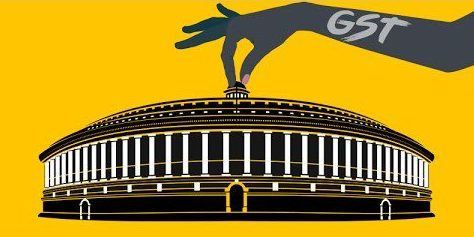
BJP/RSS, GST and Presidential Election – Is There Light at the End of the Tunnel?
With so many political upheavals going on India, it is very difficult to wade our way through to arrive at the correct perspective. The RSS/BJP Government is set to begin GST regime on June 1, 2017. It will be launched as one of the landmark events that match with India’s other landmark historic events like India’s independence from the British and “Quit India” movement. If we listen to the dissenting voices on GST, we hear that the GST is already plagued with a lot of bureaucratic inertia and too complex and compromised to yield benefits for the economy.
RSS/BJP Government is creating much hoopla over the launch of GST.
The idea of one market and one tax regime is a great idea that was under discussion for over a decade now, but reforms of wider implications like this must be sequenced and enacted with maturity. The way various services and good were put in the different slabs is interesting and the draconian process of filing returns every month, and filing returns to the State GST and central GST, will be too much for the businesses at this moment when the small businesses throughout India are already straddled with their frozen balance sheets.
The demon of demonetization is still haunting India and India’s growth rate is reduced down to 6.1 %, which is a complete downfall of Indian economy when it was the best time to surge it further ahead. The Economist in its current edition covered Modi and Governance and presented a bleak picture of Modi’s performance. It is likely that the RSS/BJP will flare up the communal tension in the run up to 2019 elections. The Chinese economy despite of signs of hitting a road block seems to be finding new ways to move forward and it has become unstoppable with its huge innovative surge in all the areas of technology. India’s billions are still struggling with the cows, caste, communalism, and corruption.
Without reforming the society, the economy is impossible to reform. The capitalists in India are already fighting with each other. The telecom war is one of those areas in which one can glimpse into the nature of India’s capital struggling. The Telecom ministry has become the de facto regulator to solve this complicated problem of messy balance sheets, debts, and oligopoly. Indian economy is already making many compromises when the debarred corrupt defense industries are now free to work with their Indian counterparts like Reliance Defense (By Indian counterparts can always mean some variation of Reliance or Adani’s empire)
And here comes the Presidential election. It is actually not a presidential election, but the cheap way of dealing with the rising aspirations of India’s quarter of the population who are the most politically sensitive community and the most vocal voice for the democracy and its survival. The Presidential election is about the “Dalit” aspirations and how to cow it down with tokenism and cheap co-option. The independence of the Ambedkarite movement is the key to the survival of democracy in this country. Radical Ambedkarism is nothing but another name of democracy: freedom and equality for all based on mutual love and respect.
Going back to the heydays of Bahujan movement when the Congress was branded as “Nagnath (the King Cobra)” and the Hindu Fundamentalists as the “Sanpnath (the King Snake)” by the Bahujan movement. The small version of that is being played in the presidential election, but this time, both the game is played through the proxies. It is a proxy war. Kovind is a Dalit (and Mahadalit, according to Nitish Kumar) who is a lifelong RSS cadre and Meira Kumar is a Dalit (and anti-Ambedkar Dalit, according to many pieces of evidence available) are fighting to occupy India’s highest ceremonial post.
It is Dalit v/s Dalit fight for the President and the UPA and NDA will try to pose their “Ambedkarite credentials” to India’s citizens through this battle of claim over Dalits. The Dalits should realize that they are powerful but becomes powerless in the absence of organizing principle that synchronizes their movements which run in thousands throughout India, and increasingly abroad.
The BSP that started with the Dalit aspiration to power should have come out of this fray and ideally should have posed its own candidate, perhaps a powerful radical Ambedkarite, who would symbolically represent the true face of Ambedkarism. The Ambedkarites are struck when the political heavyweights lock the horns or make them fight like angry cocks bent on killing each other. In India, the politics have one only major player, the Dalits, but this player is not playing its game.
Author – Mangesh Dahiwale, Human Rights Activist



+ There are no comments
Add yours